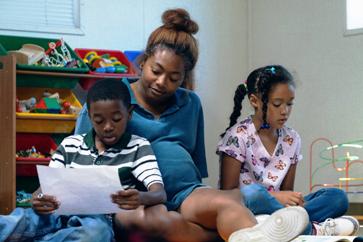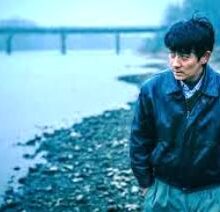

A single mother whose kids were taken away tries to win them back, while she considers offering another child on the way for adoption.
Earth Mama, from first-time filmmaker Savanah Leaf, tells the story of a young Black pregnant single mother in Oakland named Gia, and played by Tia Nomore. Successfully avoiding tiresome exposition, Leaf introduces us immediately into Gia’s world. First we witness her answering questions at an office in Child Protective Services. Her two children, a boy and a girl, were taken into foster care when the office was alerted to Gia’s drug use. She’s been mandated to take classes in self- and child care, and the time that takes, she complains, makes it impossible to earn enough money working. She works part time at a photography studio in a local mall, which offers portraits in front of pictorial backgrounds, often for couples or families. This is one of the film’s quietly meaningful effects. The various people having their portraits taken enacting the rituals of happiness that they want to memorialize—an engagement, a new kid, a reunion of friends, and so forth—from Gia’s point of view represent some of her aspirations which often seem out of reach.
We feel the emotional impact when Gia visits her kids, staying at an institutional foster care center. She gets only one hour with them. Her boy is heartbroken and clinging, missing her terribly and wanting her to take him home. The younger child, the daughter, is coloring and won’t even talk to her mother, quietly acting as if she’s not there, even as Gia tries to reassure her that it’s going to be OK. Her pregnancy represents another crisis. What kind of life can she give her baby under these conditions? This causes her to discuss the possibility of adoption with one of the counselors doing workshops that she’s been going to. Tentatively and with strong misgivings, she agrees to see a Black family who are interested in adopting.
Who are the fathers? We never hear about them, and in this Leaf quite rigorously refuses to blame her characters, using the real background of economic and racial injustice as an unspoken assumption.
Leaf is a writer, photographer, and former Olympic volleyball player who can now add successful film director to her description. Her smooth, un-showy style uses silence to bring us into Gia’s interior life. There’s plenty of noise around her, but we are also privileged with the sense of her lonely self trying to get through her fears and regain her family. Her best friend Trina is an ally in her fight to get custody, but Gia’s willingness to consider adoption offends her Christian beliefs, and she scolds her for it. Another friend, Mel, supports her without any such moralizing. The conflict within Gia is also the conflict between these two friends, but Gia is intolerant of drama in her life, trying to keep a balance.
Leaf’s patience with her characters and their process makes us more patient watching the film. Nomore’s performance is superb. The title, Earth Mama, seems paradoxical in an urban environment, but then Leaf gives us Gia’s dreams and visions, which includes her walking nude and pregnant through a huge forest, gazing up at the trees.
I use the word realism a lot. All it means to me is an honest depiction of life as it’s experienced. Savanah Leaf has found her way. Earth Mama is a journey to self-respect for a woman and a community, and an affirmation of shared reality.






